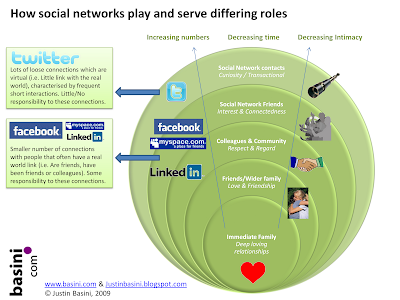The different role of social networks Facebook v. Twitter
You can now listen to this blog as a slidecast going through the model and data. Click play below. Or you can just read the text below.
There's been a lot written recently on some of the changes which Facebook have introduced to try and stave off the threat from Twitter. We all know that Facebook tried to buy Twitter in November last year and were rejected - so we know that Facebook is interested in micro-blogging and are pushing their status updates functionality.
This prompted me to think a little more deeply about the differences between Twitter and Facebook in terms of type of network built and communications employed. This leads me to believe that Twitter and Facebook (in their current forms) occupy different spaces and can co-exist quite happily.
The following diagram illustrates some of the differences between the major social networks in my mind based on the intimacy, time, numbers and purpose of relationships in a person's life.
At the core of of our relationship map are deep, loving relationships with close family. Then comes our relationships with wider family and friends. After this are community relationships and relationships with our colleagues. Then we get into the areas where social networks have really had a major impact: previous or infrequent friends and contacts and even people we will never meet in the real world.
Facebook is perfectly positioned to fill the needs of interest and connectedness with a wider circle of friends we used to know or don't see frequently. Of course it still has relevance for closer relationships but the new thing it adds is an unrivalled ability to stay in touch with a wider group of people that you have probably known in the real world. It's optimised for this purpose through features such as approval of friends, having "on platform" media rich options (photos, videos etc), allowing detailed status updates.
Twitter is different to Facebook because it extends the social networking phenomenon into a new territory of those that you probably don't know or haven't known in the real world and is optimised for fast communications. It fulfils the need of curiosity on a broader scale - following famous people, or thought leaders, or organisations is interesting and engaging. In Twitter you can follow anyone and anyone can follow you - no need for approvals. Because of this there is no real responsibility to your network of followers - as I have put it before Twitter is take it or leave it communication. Of course many of us (including me, @justinbasini!) try to share interesting updates but there is no expectation which there is more of in Facebook.
LinkedIn is a good example of a vertically focused social network focused on business contacts. It bridges between work relationships past and present, together with people you want to build relationships with in the real world for business or career success.
I think the usage numbers bear out the fact that Facebook and Twitter are used to serve different needs:
Time spent per user on Facebook is much longer than Twitter but Twitter has many more visits per month. This fits with a usage pattern that is less involved and more frequent. I also think the average number of connections is interesting. On average Facebook users have 130 friends. Social theory holds that groups of 100 to 150 are the most relationships that one individual can meaningfully hold. I suspect that this will grow as we get more comfortable with technology based contact but I don't think this average will ever be 1000s.
Now clearly at the moment the number of Twitter followers on average is low at around 20. But what I think is interesting is that if you take the top 10% of Twitter users (who we could call the early adopters and might be indicative of future usage) their number of followers on average is 483 and it is increasing fast. I think the average number of followers on Twitter could well be 1000s in the future. This definitely means it will be a different sort of network to that which one has on Facebook and potentially very exciting since you could use it to get an insight into many more different people around the world.
As always PLEASE feel free to comment with your views and share with others who you think might find this blog interesting. Oh and please follow me on Twitter (@justinbasini).
Yours
Justin
justin@basini.com
http://www.basini.com/
justinbasini.blogspot.com
www.twitter.com/justinbasini
Did you know you can sign up for updates from Justin Basini? Click here


